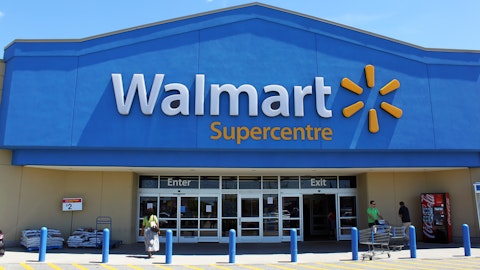Lance Fritz: So it’s in hand, and to your point, Brian, if something occurs, we should be seeing that basically right now, it should start. In terms of the STB on embargos. So, yeah, we were called in for a two-day hearing. The reason is that Union Pacific historically in 2022 had used embargoes more so than all of our peers. We use it for a very specific reason and we use it as a last resort. The reason why we use embargoes is either if something has occurred in the network like, call it, winter storm Elliott that really negatively impacted the Great Lakes region. So that we don’t get overwhelmed as we are trying to recover from the winter weather, we will use an embargo in that circumstance to control product flow. That’s not to stop growth.
It’s basically controlled product flow, so the network can get its feedback under it. It’s worked wonderfully in that area, because you can see in our car velocity and the overall network fluidity, we are operating quite well. We will also use embargoes to control excess inventory in very targeted circumstances as a last resort. We engage the customers, help them understand what we see and what they could do to help control that excess inventory, and then as a last resort, we would use an embargo. The vast majority of them are about protecting the serving yards for our customers. That’s where cars end up and before the last mile delivery to customers they get inventoried at the serving yard. And if a particular customer has way more inventory in that serving yard than what they can handle or what supports their business, it can crowd out the service product for others.
So that’s the reason we were called in is we use those more so than anyone else. We — I am not sure exactly what’s going to come out of that hearing. What we heard from our customers and through the STB and in continuing conversation with our customers is they want to know why and how to remedy with a lot more granularity. So we have modified what we communicate to our customers so that they understand that. And our commitment was we are going to pause on the level of embargoes that we have been using so that we can absorb the feedback and make some additional changes in how we approach excess inventory and serving yard excess inventory and engage with customers more effectively on it. Kenny?
Kenny Rocker: All right, Brian, you win the title for getting us all the talk. I will make this quick. Two things, one, yeah, we have had some pretty difficult conversations with customers. But 1 of the positives that has come out of that is creating tech solutions for them to give them the visibility that Lance was talking about, whether it’s inventory on our line, the release rates number of cars that are in the serving yard. We have shared that those tech solutions with them here a couple of weeks ago and we are working with the customer so that they can integrate that into their supply chain.
Brian Ossenbeck: Thank you very much.
Lance Fritz: Yeah. Thank you, Brian.
Operator: The next question is from the line of Jeff Kaufman with Vertical Research. Please proceed with your question.
Jeff Kaufman: Thank you very much. I will just make this quick, because a lot of mine have been answered. Kenny, what do the changes in China with their COVID policy and reopening the economy potentially mean for Union Pacific?





